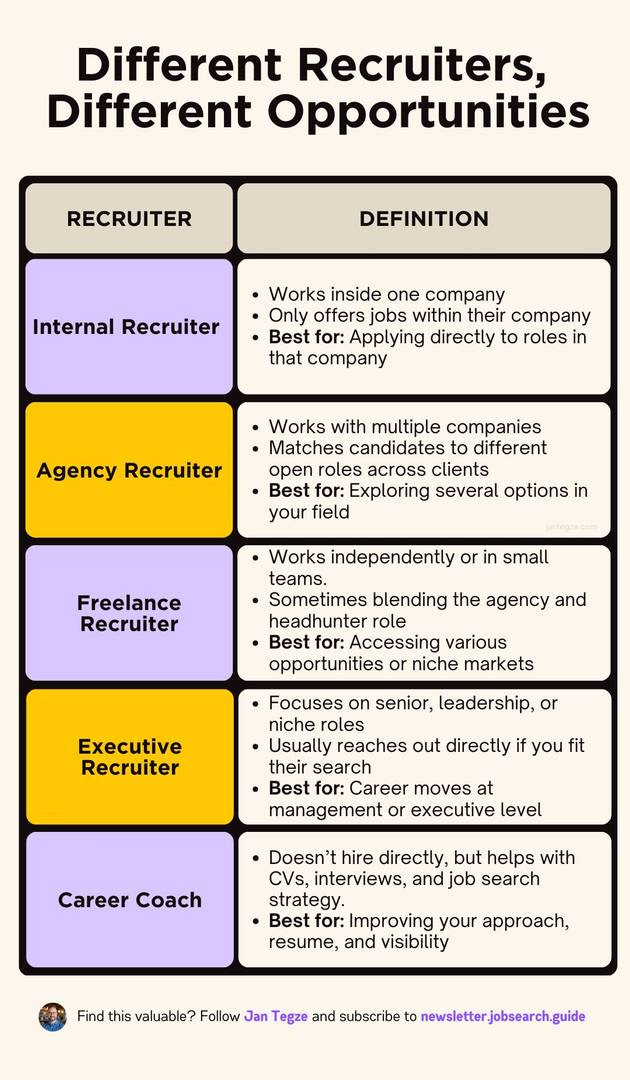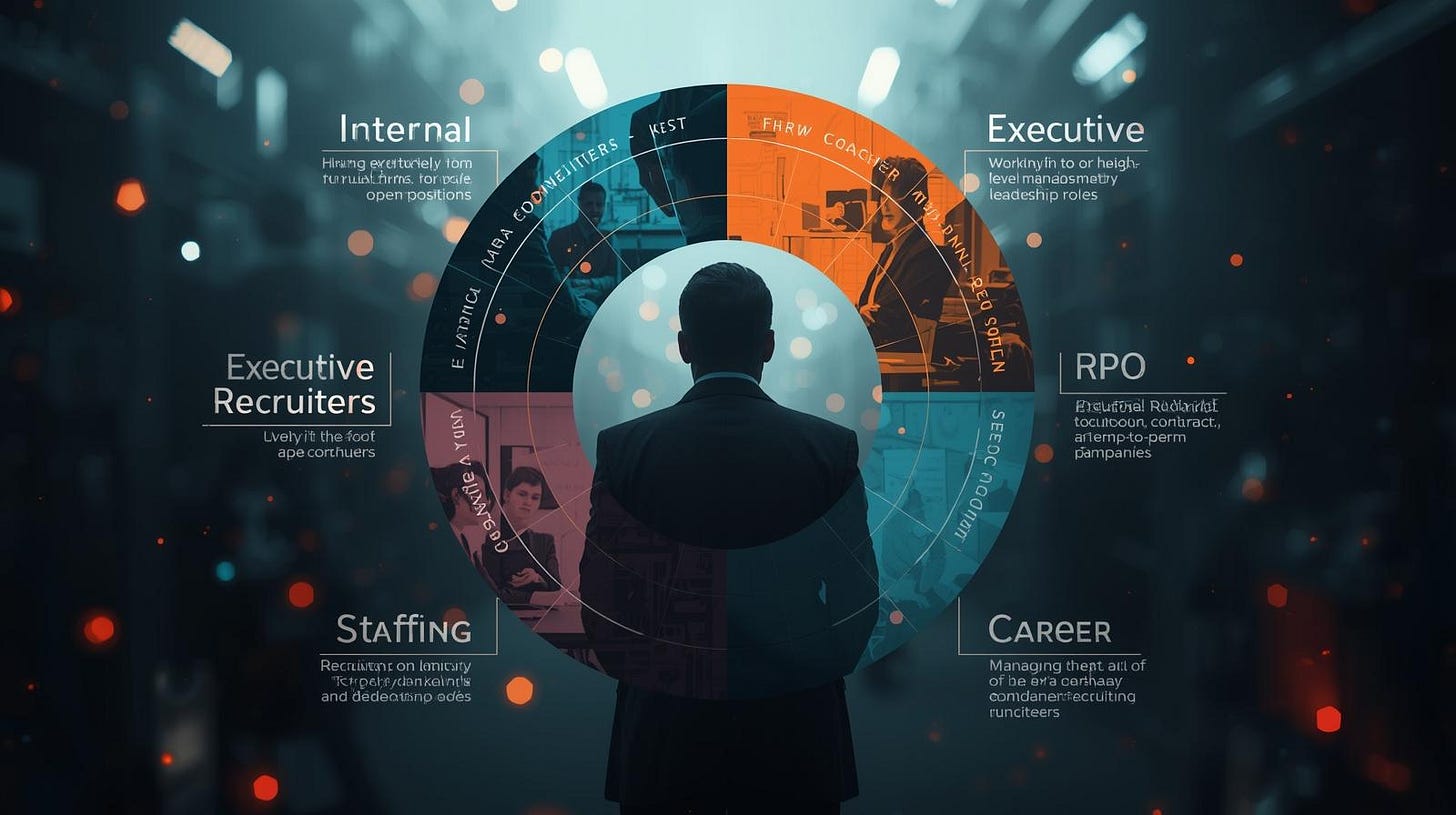Types of Recruiters and How They Work
Learn about different types of recruiters, how they work, and which one can help you reach your career goals.
Looking for a new job can feel overwhelming, especially if you do not know which recruiters you should be reaching out to. Some work inside one company, others represent many businesses, and a few focus only on senior leaders. If you do not know the difference, it is easy to waste time talking to the wrong person or expecting help they cannot give.
Not every recruiter works the same way, and not every recruiter can help you with your specific career goals. An agency recruiter in Germany, for example, cannot usually place you into a role in the United States, no matter how qualified you are. If they don’t have clients or an office, you’d just be wasting everyone’s time.
I will walk you through the main types of recruiters, how each one works, and when it makes sense to connect with them. You will see where internal recruiters, agency recruiters, executive recruiters, and even career coaches fit into your search.
By the end, you will know exactly which recruiter to reach out to and why, so you can spend less time guessing and more time moving toward the right opportunity.
Internal Recruiters: The In-House Experts
Internal recruiters, sometimes called in-house or corporate recruiters, work directly for the company that is hiring. They are not outsiders. They are part of the Human Resources or Talent Acquisition team and focus only on filling jobs within their own organization.
How They Work
Internal recruiters know the company inside out. They partner with hiring managers to define the role, write job descriptions, and understand what kind of person would be a good fit. Once the job is open, they start looking for candidates through:
Their internal candidate database (ATS)
Direct applicants coming from the company career page or job portals
Employee referrals
Professional networking sites like LinkedIn
After sourcing, they handle first-round screenings, schedule interviews with managers, and guide candidates through the offer and onboarding steps.
What Makes Them Different
Deep company knowledge: They can tell you exactly what the team culture is like.
Long-term focus: They are not just filling a seat, they want someone who will grow with the company.
Budget-friendly for companies: Since they are on payroll, companies save money compared to hiring an outside agency. It’s a common misconception, but they aren’t actually paid per hire.
When It Makes Sense to Connect
If you are aiming for a specific company, an internal recruiter is your best entry point. They cannot place you anywhere else, but they can be your direct line into that one employer.
Example Scenario
Say you are applying to a role at IBM. An internal recruiter will be the person reviewing your resume, calling you for a screening, and making sure you move smoothly through the process if you are a fit.
Agency Recruiters: Broad Networks Across Companies
Agency recruiters, also called external recruiters, work for staffing or recruiting firms that serve many different clients. Unlike internal recruiters who focus on one employer, agencies act as a bridge between multiple companies and job seekers.
How They Work
Agency recruiters are paid by their client companies, not by you as the candidate. Their day-to-day work usually includes:
Searching their databases and networks (LinkedIn…) for suitable candidates
Posting jobs on behalf of their clients
Reviewing resumes and shortlisting candidates
Introducing those candidates to the client company
Because they juggle several clients, agency recruiters may be able to present you with opportunities at more than one company at the same time.
What Makes Them Different
Variety of options: They can open doors at several companies in your field.
Speed-focused: Many work on contingency, meaning they are only paid if their candidate is hired. This motivates them to act fast.
Industry knowledge: Some specialize in fields like IT, finance, or healthcare, which makes them valuable if you want to stay in a specific sector.
When It Makes Sense to Connect
If you want to explore multiple job options quickly, an agency recruiter is a good partner. They can give you exposure to roles that are not always posted online.
Example Scenario
Imagine you are a marketing professional looking for your next step. An agency recruiter might connect you with five different companies that are hiring for similar positions, helping you compare and choose the best fit.
Freelance Recruiters: Independent Operators
Freelance recruiters are self-employed or work in very small teams. They often blend aspects of agency recruiting and headhunting, using their own networks and contacts to connect candidates with companies.
How They Work
Since they are not tied to a large firm, freelance recruiters rely heavily on personal connections and reputation. Their process usually looks like this:
Building relationships with both job seekers and hiring managers
Sourcing candidates through LinkedIn, referrals, and direct outreach
Acting quickly and flexibly, since they are not limited by a big agency’s structure
Because they manage their own business, they may take on fewer roles at a time, which means they can give candidates more individual attention.
What Makes Them Different
Personal touch: They often know their market well and maintain close ties with both sides.
Flexible approach: Without strict corporate rules, they can be more creative in how they match candidates and jobs.
Niche focus: Some freelance recruiters specialize in specific industries, like startups, tech, or creative roles.
When It Makes Sense to Connect
If you are in a specialized field or targeting startups, a freelance recruiter may open doors others cannot. They might also be a good choice if you value a recruiter who knows you personally and stays in touch long-term.
Example Scenario
You are a software developer looking to join a fast-growing startup. A freelance recruiter who focuses on tech startups may already know the founders and can introduce you directly, instead of sending your resume into a generic portal.
Executive Recruiters: Focused on Leadership Roles
Executive recruiters, often called headhunters, specialize in finding leaders for senior or highly specialized positions. They usually work on a retained search basis, meaning they are paid upfront by the company to find the right person.
How They Work
Executive recruiters focus on quality over speed. Their process often includes:
Partnering with the company in an exclusive agreement
Researching the market and identifying candidates who may not be actively job hunting
Reaching out directly to high-level professionals with discreet conversations
Running detailed interviews and assessments before presenting a shortlist to the client
Recruiter vs Headhunter (Executive recruiter)
The terms can sound confusing. In practice, “recruiter” is the broader word. A headhunter is a type of recruiter who targets passive candidates, usually for leadership or executive roles. If someone calls themselves a headhunter, expect that they are not filling entry-level jobs, but rather senior or niche positions.
What Makes Them Different
Exclusive focus: They only work on a few assignments at once, but each one is high stakes.
Discreet searches: They often approach candidates confidentially, without job ads.
Leadership impact: They shape entire management teams by placing top-level talent.
When It Makes Sense to Connect
If you are at a director, VP, or C-suite level, executive recruiters are often the ones who will bring you your next big opportunity. For mid-level roles, it is less likely you will work with them.
Example Scenario
You are a CFO at a midsize company. An executive recruiter might call you about a confidential opening at a Fortune 500 firm. The job was never advertised publicly, but because the recruiter is retained, they are trusted to bring in the right shortlist.
Staffing Agencies: Flexible Short-Term Placements
Staffing agencies focus on filling temporary, contract, or temp-to-perm roles. Unlike executive recruiters who work on discreet searches, staffing agencies are built for speed and volume.
How They Work
Staffing agencies maintain large databases of pre-screened candidates. When a client company needs quick help, the agency can pull from this pool and place someone almost immediately. Their role often includes:
Matching candidates to short-term or project-based assignments
Acting as the employer of record, handling payroll, taxes, and benefits
Billing the client an hourly or project rate that includes both the worker’s pay and the agency’s fee
What Makes Them Different
Quick turnaround: They can often fill a role within days.
Employer of record: You are technically employed by the agency, not the client company.
Good for flexibility: Many people use staffing agencies to gain experience, fill employment gaps, or earn income while searching for permanent work.
When It Makes Sense to Connect
If you are open to temporary work, need flexibility, or want to get your foot in the door at a company, a staffing agency is a strong option. Many temp-to-perm roles start here and later convert into full-time jobs.
Example Scenario
You are between jobs and need steady income. A staffing agency places you as a customer support contractor for three months. The company likes your work, and at the end of the contract, they offer you a permanent position.
Recruitment Process Outsourcing (RPO): Scaled Hiring Solutions
Recruitment Process Outsourcing, or RPO, is when a company hands over all or part of its recruiting to an outside provider. Instead of just filling a few roles, the RPO team works as if they are part of the company’s HR department.
How They Work
An RPO provider becomes deeply embedded with the client’s hiring process. Their work often includes:
Partnering with managers to understand hiring goals
Running sourcing, screening, and interview scheduling
Tracking metrics like time-to-fill and cost-per-hire
Scaling the team up or down based on how many people the client needs to hire
To a job seeker, the process may look almost the same as applying directly to a company. The main difference is that the recruiter you talk to may not be a company employee, but part of the RPO provider.
What Makes Them Different
Embedded approach: They act like an extension of the HR team.
Scalability: They can handle hiring spikes or ongoing needs.
Process-driven: They track results closely and use structured systems.
When It Makes Sense to Connect
If you are applying to a large company that has outsourced its recruitment, chances are you will interact with an RPO recruiter. It is not something you usually seek out on your own, but knowing what it means helps you understand who you are talking to.
Example Scenario
A global bank needs to hire 500 analysts in one year. Instead of building a huge HR team, they partner with an RPO provider. As a candidate, the recruiter you speak with might work for the RPO firm, but they handle your application just like an internal recruiter would.
Career Coaches: Guiding Your Job Search
Career coaches are not recruiters, but they often get mentioned in the same conversations. Their job is to help you become a stronger candidate, not to place you into a role.
How They Work
Career coaches focus on your personal brand and job search strategy. They can:
Review and improve your resume or LinkedIn profile
Help you prepare for interviews through practice sessions
Advise you on networking and career moves
Keep you accountable during your job search
Unlike recruiters, they work for you directly. You usually pay them for their time or for a package of services.
What Makes Them Different
Candidate-first focus: Their loyalty is to you, not to a hiring company.
Skill-building: They help you sharpen how you present yourself.
Ongoing support: Many offer coaching over weeks or months to keep you on track.
When It Makes Sense to Connect
If you feel stuck in your search, keep getting interviews but no offers, or are unsure how to position yourself for a new career direction, a career coach can be a valuable partner.
Example Scenario
You keep applying for jobs but are not getting interviews. A career coach reviews your resume, rewrites it to highlight measurable results, and practices mock interviews with you. Within weeks, you start hearing back from employers.
Why Your Recruiter’s Location Can Decide Your Job Search
Many job seekers assume that once they have a recruiter’s attention, that person can open doors anywhere in the world. It sounds nice in theory, but it is rarely how the hiring world works. Let me share with you the best tips on how to get recruiters' attention in the right way:





